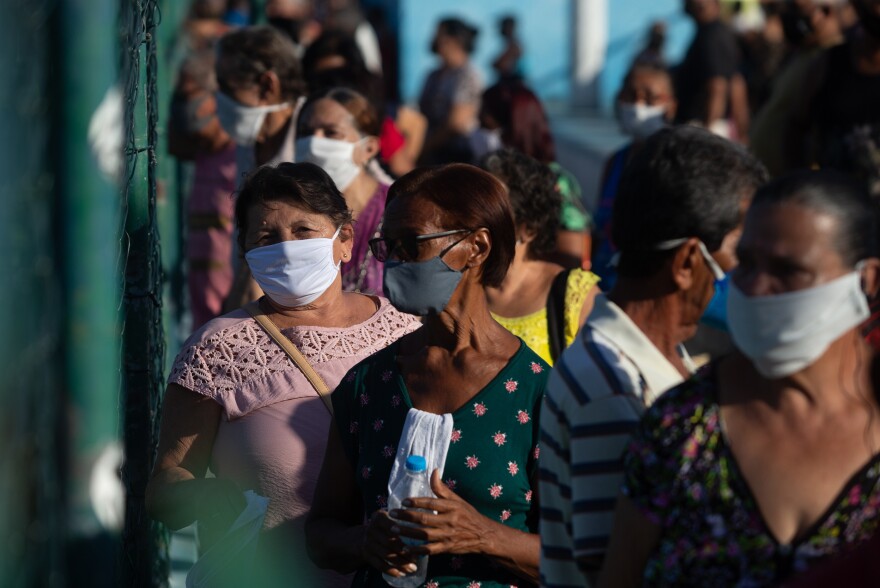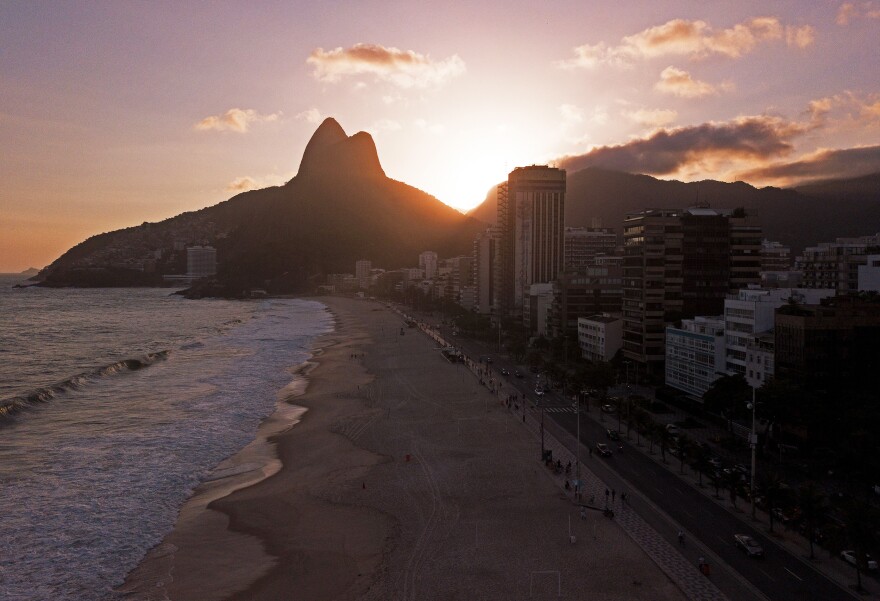RIO DE JANEIRO — Cinthia Ribeiro knew she had a fight on her hands when COVID-19 arrived in her hometown in Brazil. What she didn't know was that, one year on, humans would be out to kill her, too.
Ribeiro is mayor of Palmas, capital of Tocantins, a small state wedged between the southeastern edge of the Amazon rainforest and the Cerrado, South America's tropical savanna.
The fresh wave of infections now racing across the landscape has reached her city, flooding hospitals with patients, and pushing intensive care unit occupancy rates up to 96%.
The country is now widely viewed as the epicenter of the pandemic, with the highest number of daily deaths of any nation. On Tuesday, that number topped 3,000 for the first time, with 3,251 deaths recorded.
And this week, Brazil's registered COVID-19 deaths rose above 300,000 — a toll exceeded only by the United States. Ribeiro bleakly remarks that this number is about the same as the population of her city.
Worried that local health systems would collapse, and there would be many more deaths than the several hundred already logged by Palmas city officials, the mayor tried to buy time.
This month, she placed her city under what she calls a "partial lockdown." She shut down the beaches in her jurisdiction along a 106-mile-long lake and banned the public from visiting parks and waterfalls. Supermarkets, bars and restaurants were restricted to deliveries only.
Then came the backlash
"I have suffered real and serious threats against my life," Ribeiro, 44, told NPR.
She said she was bombarded with death threats on her cellphone and social media platforms. A crowd gathered outside her apartment block, yelling abusive comments. People raced by in cars in the middle of the night, shooting fireworks at the building.
O #ConsórcioConectar surge como uma das opções p/ que possamos vacinar a população, suprindo a deficiência do PNI, q ainda está longe de ser minimamente ideal. É hora de todos os entes se unirem, p/ juntos encontramos uma solução que nos ajude a sair dessa crise que afeta a todos
— Cinthia Ribeiro (@CinthiaCRibeiro) March 22, 2021
Ribeiro finds it astonishing these attacks by whom she describes as far-right extremists would happen in the middle of a catastrophic pandemic.
"We are trying to save lives! We are fighting against a health crisis," she said. "Yet our lives are being endangered as well."
Public health systems in "collapse"
In more than half of the country's 26 states, ICU occupancy rates have hit 90% or above, according to a bulletin posted March 16 by the Brazilian medical research institution Fiocruz. Brazil's public health systems are "living through the worst collapse in history," it said.
There have been numerous reports in Brazilian media and on social media platforms of patients dying while waiting for beds, shortages of medicines and oxygen, and bodies being dumped in hospital corridors.
Once admired worldwide for its fast and efficient national immunization drives, Brazil has seen its COVID-19 vaccination program plagued by political infighting, bureaucratic blunders and supply problems.

So far, three COVID-19 vaccines have been authorized by Brazil's health regulators — AstraZeneca, CoronaVac and Pfizer. Fewer than 7% of Brazilians have had one dose.
"The situation is very, very concerning," said Tedros Adhanom Ghebreyesus, director-general of the World Health Organization. "Brazil has to take it seriously."
Yet medical professionals said that is easier said than done.
A president who yanks off his mask
Brazil's president, Jair Bolsonaro, turned 66 on Sunday.
He marked the occasion by appearing before hundreds of flag-waving supporters outside the presidential palace who, with little regard for physical distancing, gathered there to sing Parabéns (the traditional birthday congratulations) and hand him a birthday cake decorated in Brazil's yellow and green national colors.
Standing before the cheering crowd, Bolsonaro yanked off his face mask and began lambasting governors and mayors who are imposing restrictions in towns and cities across the country.
"Some little tyrants, or tyrants, hinder the freedom of many of you," the retired army captain said.
He declared that Brazilians could "count on the armed forces" to defend their liberty and democracy, including the constitutional right to free movement, without explaining how the military might do so.
"I will do anything for my people!" he declared.
This month, Bolsonaro petitioned the Supreme Court to stop three governors from imposing nighttime curfews. Although they are usually lightly enforced in Brazil, he calls them "a state of siege."
He no longer dismisses COVID-19 as "a little flu." Yet he maintains lockdowns are more harmful than the virus because they create mass unemployment. That "leads to depression, violence, fights, deaths and chaos," he warned his audience on Facebook Live.
To prevent the pandemic from unleashing a wave of poverty last year, his government responded by making emergency payments of $110 a month to more than 65 million Brazilians. Now, facing growing debt, it has cut that sum to $27 — far too little to survive on.
Bolsonaro predicts even more trouble. "Shops will be looted, buses will be torched, there will be serious unrest," he declared.
Frustration and fear in the medical community
Brazil's medical professionals and scientists are watching their president with disdain and alarm and worrying about what will happen next.
"Brazil now represents a threat to global public health," said Dr. Pedro Hallal, coordinator of Epicovid-19, the largest epidemiological study into the coronavirus in Brazil.

With the virus out of control, he said he believes Brazil is a breeding ground for more variants that could prove even more lethal and spread to other countries.
"The virus is circulating so widely in Brazil that it is possible, and I would say likely, that new variants will appear in the near future. We need to stop that urgently," he said.
Hallal wants an international task force made up of governments, health organizations and pharmaceutical companies to get far more vaccines to Brazil as soon as possible. If not, "global efforts to control COVID-19 will be jeopardized," he said.
The return of "Lula"
Consensus is also growing among the upper echelons of Brazil that Bolsonaro's handling of the pandemic has been a disaster that is causing avoidable deaths at home and massive reputational damage abroad.
Hundreds of prominent figures from the financial world — including ex-ministers and five former presidents of Brazil's Central Bank — have published an open letter criticizing his government's conduct.
Although the letter does not name Bolsonaro, it complains that Brazil's "largest political leadership" shows "a disdain for science, looks to remedies without evidence of their effectiveness, encourages crowds, and flirts with the anti-vax movement."
The signatories are calling for a nationally coordinated policy of social distancing, including a national lockdown if necessary, a federal-level COVID-19 coordinating body advised by scientists and specialists, free masks and far more vaccines as soon as possible.
Adding to the pressure on Bolsonaro is the return to the limelight of his chief adversary, former President Luiz Inácio Lula da Silva, universally known as "Lula."
On March 8, a judge annulled da Silva's corruption convictions, allowing him — at least for now — to run in next year's elections. The charismatic 75-year-old leftist announced his unexpected comeback by berating Bolsonaro for his "ignorant" pandemic response, and getting vaccinated on TV.
Most Brazilians appear eager to follow the ex-president's example: Eighty-four percent want to be vaccinated, according to a Datafolha poll published on Saturday.
Mayane Brito, 32, a district nurse, travels around remote villages in Paraíba in northeast Brazil, administering vaccines. She said older patients are "laughing in their eyes" when they see her arrive. Yet there are not nearly enough vaccines, and the overall picture in her area is "a calamity," she said.
After jesting that vaccines might "turn you into a crocodile" and declaring he would never have the injection, Bolsonaro has begun to shift ground: He now loudly advertises his health ministry's vaccination efforts and claims Brazil will acquire "500 million doses" this year.

Even if true, that is too late, said Dr. Margareth Dalcolmo, a respiratory physician and researcher at Fiocruz.
"We need vaccines now! We have to intercept the transmission of this virus in the community. We already have four variants ... responsible for most of the cases in seven states of Brazil. This is [a] very, very worrying fact."
Hallal puts the situation in starker terms: "If we do not have enough vaccines in the next 30 to 45 days, the situation will be terrible — not only for Brazil, but for the rest of the world."
Copyright 2021 NPR. To see more, visit https://www.npr.org.


